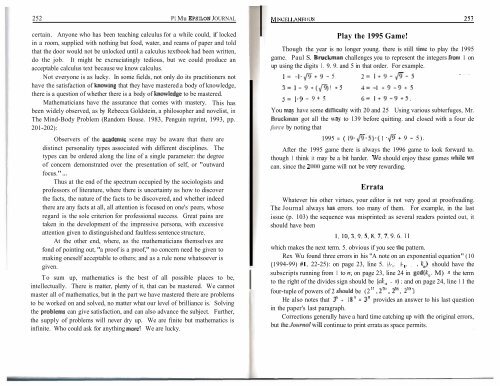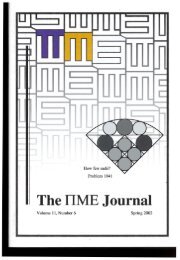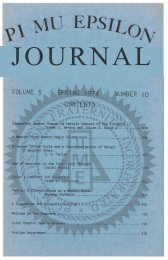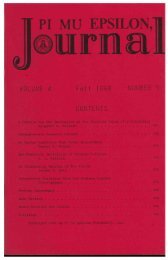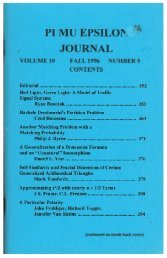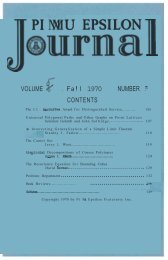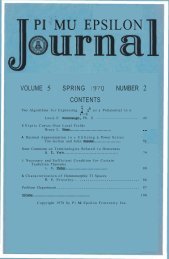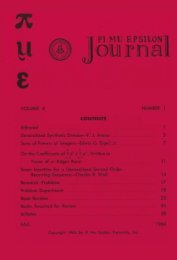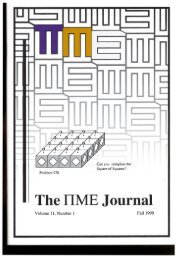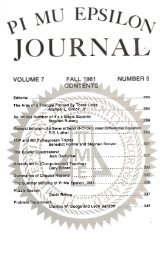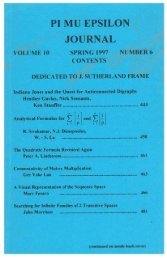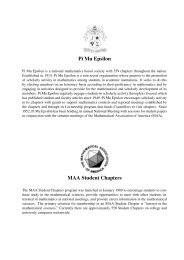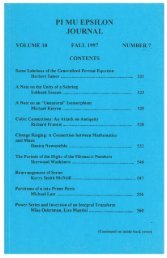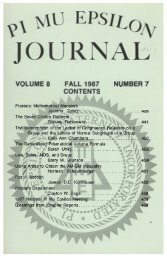MISCELLANEOUS 25 1Whatever the degree of its glory, mathematics has matter. Mathematicshas problems to be solved, problems with substance. Crossword puzzles, andthe mathacrostic that appears in this issue, are problems to be solved as well,but once they are solved, what of them? They are insubstantial, and they arediscarded and forgotten. Their solution does not get us anywhere.Solving problems in mathematics does get us somewhere. First, we solvequadratic equations. Then. a couple of thousand years later, we solve cubicsand, almost immediately, quartics. After another two hundred years, we showthat we can't solve quintics. <strong>No</strong>t all of them, that is, but only some-whichones? Galois finds out, and starts group theory. Just a little while ago we (andit took a lot of us. working together) found all the finite simple groups. We aregetting somewhere. Progress is being made. What do we do next-are wedone? Certainly not: there are plenty of problems left-infinitely many, infact-and we will never be done.This is not so in all lines of intellectual endeavor. Take philosophy forexample, whose date of birth was approximately the same as mathematics'.There are many problems and many questions that can be asked, but there areno answers. Someone said that the history of philosophy consists of attemptsto answer questions that Plato asked. Philosophy does not seem to getanywhere. Progress can be said to be made-the questions become moreclear-but it is not the same as progress in mathematics. A philosopher willwrite a paper and some other philosopher will write another paper saying thatIthe first philosopher is an idiot. Well, not quite that, but the secondphilosopher will point out things that the first philosopher, who was not asacute as the first philosopher, failed to notice, or interpreted wrongly. The firstphilosophcr (or a third. a friend of the first) can write a third paper explainingwhy the second philosopher is all wet. Well, not all wet, but damper than heor she should be. The cycle can go on and on, bringing us not much closer tothe answer to. for example. the question of what is knowledge and how do weknow it.ITheology's problem of evil will never be solved. In history, all we canhave are reinterpretations. And pity the poor classicists! It is possible that,lying in an attic somewhere, there is someone's dairy for the years 1862-65 thati l l shed a whole new light on the Civil War. Historians thus have a hope.1, however slim, of getting new material, but the chance of finding Sophocles'sdiary is nil: classicists have a fixed amount of material and all they can do isrearrange it in difircnt ways.In mathematics we havc it better. The amount of material is infinite, andwe make progress. Of course, progress is made in the sciences, but it is not thesame. Once the physicists construct their grand theory of everything and verifyit sufficiently by experiment, that's it. They're finished. They can all be givengold watches and put out to pasture, or be put into classrooms explaining F =ma to the next generation. It will take longer to wind up chemistry, but thereare only finitely many elements and I think only finitely many compounds thatcould exist and be stable. Once everything is known, there is nothing more tofind out. Biology is harder yet and we have a long, long way to go, but the endof biology is also conceivable. But mathematics will have no end, ever. Therace may get tired of the subject and stop pursuing it, but that will be becausethe race is exhausted, not mathematics.Another huge advantage of mathematics is that it has matter at all levelsto be worked on. Very few of us have the ability and the courage to attack theRiemann Hypothesis, but more of us can do things like finding equivalentstatements of it (they might be easier), or of verifying that the next few millionzeros of C(s) lie on the critical strip (a counterexample might turn up).Contributions on lower levels can be made. May I mention the best theoremthat I ever proved? It was known that the fractional parts of {n cos n} areuniformly distributed on [O, 11 and those of {cos n} are not: where does theswitch occur? The answer is that for any f(n) that goes to infinity, no matterhow slowly, the fractional parts of { f(n) cos n} are uniformly distributed.<strong>No</strong>t an important result, but satisfying.The capacity for satisfaction exists at all levels. All journals ofmathematics aimed at general audiences, including this one. havc problemsections. They do not have them because it is the right thing to do, they havethem because their readers like them. They are sometimes the most popularparts of the journals. The reason is obvious: they provide matter, matter forreaders to work with and sometimes triumph over. And any reader can grapplewith it.Lucky us! All of us have matter that we can deal with. Do journals ofphilosophy have problem sections? I have not made a survey, but I doubt it.The vast majority of people with training in philosophy do not have any matterto occupy them. They can read and appreciate the works of the masters of thefield, just as we can, but they do not have anything to do. The same holds forstudents of history, classics, and almost anything else.Mathematics is wonderful. <strong>No</strong>t only does it have matter that can engage.any of us, it also gives us the satisfaction of knowing that we have mastered thematter. When you know calculus, you know it, once and for all, and for
252 PI <strong>Mu</strong> EPSILON JOURNALcertain. Anyone who has been teaching calculus for a while could, if lockedin a room, supplied with nothing but food, water, and reams of paper and toldthat the door would not be unlocked until a calculus textbook had been written,do the job. It might be excruciatingly tedious, but we could produce anacceptable calculus text because we know calculus.<strong>No</strong>t everyone is as lucky. In some fields, not only do its practitioners nothave the satisfaction of knowing that they have mastered a body of knowledge,there is a question of whether there is a body of knowledge to be mastered.Mathematicians have the assurance that comes with mastery. This hasbeen widely observed, as by Rebecca Goldstein, a philosopher and novelist, inThe Mind-Body Problem (Random House. 1983, Penguin reprint, 1993, pp.201-202):Observers of the academic scene may be aware that there aredistinct personality types associated with different disciplines. Thetypes can be ordered along the line of a single parameter: the degreeof concern demonstrated over the presentation of self, or "outwardfocus." ...Thus at the end of the spectrum occupied by the sociologists andprofessors of literature, where there is uncertainty as how to discoverthe facts, the nature of the facts to be discovered, and whether indeedthere are any facts at all, all attention is focused on one's peers, whoseregard is the sole criterion for professional success. Great pains aretaken in the development of the impressive persona, with excessiveattention given to distinguished and faultless sentence structure.At the other end, where, as the mathematicians themselves arefond of pointing out, "a proof is a proof," no concern need be given tomaking oneself acceptable to others; and as a rule none whatsoever isgiven.To sum up, mathematics is the best of all possible places to be,intellectually. There is matter, plenty of it, that can be mastered. We cannotmaster all of mathematics, but in the part we have mastered there are problemsto be worked on and solved, no matter what our level of brilliance is. Solvingthe problenls can give satisfaction, and can also advance the subject. Further,the supply of problems will never dry up. We are finite but mathematics isinfinite. Who could ask for anything more? We are lucky.Play the 1995 Game!Though the year is no longer young. there is still time to play the 1995game. Paul S. Bruckmiin challenges you to represent the integers from 1 onup using the digits 1. 9. 9. and 5 in that order. For example.I= -1./9"+9 -5 2= 1+9-1/9'-5- . .-3= 1-9+(/9)! +5 4=-1+9-9+55= 1-9 -9 + 5 6= 1+9-9+5.You may have some dilliculty with 20 and 25 Using various subterfuges, Mr.Bruckman got all the way to 139 before quitting. and closed with a four deforce by noting that1995 = ( l9./9-5).( l + 9 - 5).After the 1995 game there is always the 1996 game to look forward to.though 1 think it may be a bit harder. We should enjoy these games whilecan. since the 2000 game will not be vey rewarding.ErrataWhatever his other virtues, your editor is not very good at proofreading.The Journal always lias errors. too many of them. For example, in the lastissue (p. <strong>10</strong>3) the sequence was misprinted: as several readers pointed out, itshould have beenwhich makes the next term. 5. obvious if you see the pattern.Rex Wu found three errors in his "A note on an exponential equation" (<strong>10</strong>(1 994-99) # 1. 22-25): on page 23, line 5. (A-,,. A- ,. , . 4) should have thesubscripts running from 1 to n; on page 23, line 24 in gcd(A-, M) s the termto the right of the divides sign should be (ck - s) ; and on page 24, line 1 1 thefour-tuple of powers of 2 sllould be (2 l3 .2", 236, 2'" ).He also notes that ? + 18' = 3' provides an answer to his last questionin the paper's last paragraph.Corrections generally have a hard time catching up with the original errors,but theJournal will continue to print errata as space permits.
- Page 2 and 3: PI MU EPSILONVOLUME 10 FALL 1995 NU
- Page 4 and 5: KALMAN AND MATHEWS. TELESCOPING SER
- Page 6 and 7: KALMAN AND MATHEWS, TELESCOPING SER
- Page 8 and 9: KALMAN AND MATHEWS, TELESCOPING SER
- Page 10 and 11: A WEIGHTED AM-GM-HM INEQUALITYDan K
- Page 12 and 13: ON THE GIRTHS OF REGULAR PLANAR GRA
- Page 14 and 15: Acknowledgment: The author would li
- Page 16 and 17: VARBALOW AND VELLA, FACTORIZATION O
- Page 18 and 19: VARBALOW AND VELLA, FACTORIZATION O
- Page 20: VARBALOW AND VELLA, FACTORIZATION O
- Page 23 and 24: CONJECTURE 3: z(p2) = pZ(p) for all
- Page 25 and 26: Rachele DernbowskiSUNY, Stony Brook
- Page 27 and 28: SEME, HASSE SUBGROUP DIAGRAMS 217wh
- Page 29: pylp? ...p~...p? ...p? > - A.Applyi
- Page 33 and 34: PROBLEMS AND SOLUTIONS 229married c
- Page 35 and 36: PROBLEMS AND SOLUTIONS836. [Fall 19
- Page 37 and 38: PROBLEMS AND SOLUTIONS91, 92, a tot
- Page 39 and 40: PROBLEMS AND SOLUTIONS 24 1then xy'
- Page 41 and 42: that:a) Triangles ABC. PQR,and W7.
- Page 43: 248 Pi MU EPSILON JOURNALso that x
- Page 47: Subscription and Change of AddressI


